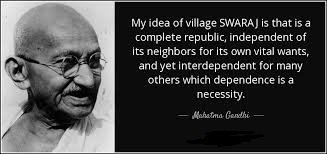Mahatma Gandhi’s concept of Swaraj, or self-rule, was a cornerstone of his political philosophy and played a crucial role in India’s struggle for independence. His idea of Swaraj was multifaceted, encompassing political, economic, social, and spiritual dimensions. Here’s a critical analysis of his concept and how it differed from the prevailing political thoughts of his time:
Concept of Swaraj
- Political Dimension:
- Self-Governance: Politically, Swaraj meant self-governance and autonomy from British rule. Gandhi envisioned an India where power was decentralized, and local self-government was promoted through Panchayati Raj institutions.
- Non-Violent Resistance: Gandhi advocated for non-violent resistance or Satyagraha as the means to achieve Swaraj. This was a novel approach compared to the more militant or violent methods employed by some contemporaries.
- Economic Dimension:
- Economic Self-Reliance: Gandhi emphasized Swadeshi, or economic self-reliance, advocating for the use of indigenous goods and the boycott of foreign products. He promoted the revival of cottage industries, particularly hand-spinning and weaving (Khadi).
- Simplicity and Sustainability: His economic vision was based on simplicity and sustainability, opposing the industrial capitalism of the West which he believed led to exploitation and environmental degradation.
- Social Dimension:
- Social Equality and Justice: Gandhi’s Swaraj included the abolition of social evils such as untouchability, and the promotion of equal rights for women. He believed true freedom could not be achieved without social justice.
- Community-Based Living: He advocated for a return to community-based living, where individuals would work for the collective good, promoting a sense of unity and brotherhood.
- Spiritual Dimension:
- Moral and Ethical Living: Gandhi’s Swaraj was rooted in a moral and ethical framework, drawing heavily from Hindu philosophy and other religious teachings. He believed in the power of personal transformation and moral integrity as foundations for societal change.
Differences from Prevailing Political Thoughts
- Approach to Independence:
- Non-Violence vs. Militancy: Unlike leaders like Subhas Chandra Bose who advocated for armed struggle, Gandhi’s insistence on non-violence was unique. He believed that the means used to achieve independence must be morally sound, and that violence would only breed more violence.
- Grassroots Mobilization: Gandhi focused on grassroots mobilization, engaging the masses in the freedom struggle through non-cooperation and civil disobedience. In contrast, other political leaders often focused on elite negotiations and formal political processes.
- Vision of Society:
- Decentralization vs. Centralization: While many political thinkers of the time, including Nehru, were inclined towards a centralized state with industrial development, Gandhi’s vision was of a decentralized polity with village self-governance and an agrarian-based economy.
- Moral Politics vs. Realpolitik: Gandhi’s politics were infused with ethical and spiritual dimensions, making him an idealist. Most other political leaders were more pragmatic, focusing on political strategies and statecraft devoid of such moral underpinnings.
- Economic Model:
- Swadeshi vs. Industrialization: Gandhi’s economic model of Swadeshi stood in stark contrast to the industrialization model favored by contemporaries like Nehru, who saw industrialization as essential for India’s development and modernization.
- Social Reform:
- Holistic Social Change vs. Political Independence Alone: For Gandhi, Swaraj was incomplete without social reform. He linked the political fight for independence with a broader social agenda, including the eradication of untouchability and empowerment of women. Many other leaders prioritized political independence as the primary goal, with social issues being secondary.
Conclusion
Mahatma Gandhi’s concept of Swaraj was a holistic vision that integrated political freedom with economic self-reliance, social justice, and ethical living. It was significantly different from the prevailing political thoughts of his time, which were often more focused on political power and economic modernization without the same emphasis on non-violence, moral integrity, and social equity. Gandhi’s ideas have left a lasting impact on India and continue to be relevant in discussions about sustainable development, social justice, and ethical governance.


